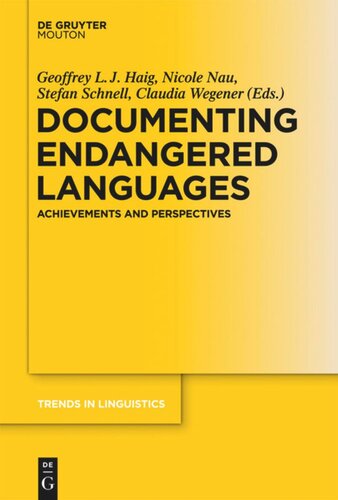

Most ebook files are in PDF format, so you can easily read them using various software such as Foxit Reader or directly on the Google Chrome browser.
Some ebook files are released by publishers in other formats such as .awz, .mobi, .epub, .fb2, etc. You may need to install specific software to read these formats on mobile/PC, such as Calibre.
Please read the tutorial at this link: https://ebookbell.com/faq
We offer FREE conversion to the popular formats you request; however, this may take some time. Therefore, right after payment, please email us, and we will try to provide the service as quickly as possible.
For some exceptional file formats or broken links (if any), please refrain from opening any disputes. Instead, email us first, and we will try to assist within a maximum of 6 hours.
EbookBell Team

5.0
40 reviewsThe rapid decline in the world's linguistic diversity has prompted the emergence of documentary linguistics. While documentary linguistics aims primarily at creating a durable, accessible and comprehensive record of languages, it has also been a driving force in developing language annotation and analysis software, archiving architecture, improved fieldwork methodologies, and new standards in data accountability and accessibility.
More recently, researchers have begun to recognize the immense potential available in the archived data as a source for linguistic analysis, so that the field has become of increasing importance for typologists, but also for neighbouring disciplines. The present volume contains contributions by practitioners of language documentation, most of whom have been involved in the Volkswagen Foundation's DoBeS programme (Dokumentation Bedrohter Sprachen).
The topics covered in the volume reflect a field that has matured over the last decade and includes both retrospective accounts as well as those that address new challenges: linguistic annotation practice, fieldwork and interaction with speech communities, developments and challenges in archiving digital data, multimedia lexicon applications, corpora from endangered languages as a source for primary-data typology, as well as specific areas of linguistic analysis that are raised in documentary linguistics.